- Home
- Brand, Max
the Garden Of Eden (1963) Page 3
the Garden Of Eden (1963) Read online
Page 3
A mood of idle content always brings one to the window: Connor looked out on the street. A horseman hopped past like a day shadow, the hoofbeats muffled by thick sand, and the wind, moving at an exactly equal pace, carried a mist of dust just behind the horse's tail.
Otherwise there was neither life nor color in the street of weather-beaten, low buildings, and the eye of Connor went beyond the roofs and began to climb the mountains. Here was a bald bright cliff, there a drift of trees, and again a surface of raw clay from which the upper soil had recently slipped; but these were not stopping points--they were rather the steps which led the glance to a sky of pale and transparent blue, and Connor felt a great desire to have that sky over him in place of a ceiling.
He splashed through a hasty bath, dressed, and ran down the stairs, humming. Jack Townsend stood on a box in the corner of the room, probing at a spider web in the corner.
"Too late for breakfast?" asked Connor.
The fat shoulders of the proprietor quivered, but he did not turn.
"Too late," he snapped. "Breakfast over at nine. No favorites up here."
Connor waited for the wave of irritation to rise in him, but to his own surprise he found himself saying:
"All right; you can't throw a good horse off his feed by cutting out one meal."
Jack Townsend faced his guest, rubbing his many-folded chin.
"Don't take long for this mountain air to brace up a gent, does it?" he asked rather pointedly.
"I'll tell you what," said Connor. "It isn't the air so much; it's the people that do a fellow good."
"Well," admitted the proprietor modestly, "they may be something in that. Kind of heartier out here, ain't they? More than in the city, I guess. I'll tell you what," he added. "I'll go out and speak to the missus about a snack for you. It's late, but we like to be obligin'."
He climbed carefully down from the box and started away.
"That girl again," thought Connor, and snapped his fingers. His spirits continued to rise, if that were possible, during the breakfast of ham and eggs, and coffee of a taste so metallic that only a copious use of cream made it drinkable. Jack Townsend, recovering to the full his customary good nature, joined his guest in a huge piece of toast with a layer of ham on it--simply to keep a stranger from eating alone, he said--and while he ate he talked about the race. Connor had noticed that the lobby was almost empty.
"They're over lookin' at the hosses," said Townsend, "and gettin' their bets down."
Connor laid down knife and fork, and resumed them hastily, but thereafter his interest in his food was entirely perfunctory. From the corner of his eye a gleam kept steadily upon the face of Townsend, who continued:
"Speaking personal, Mr. Connor, I'd like to have you look over them hosses yourself."
Connor, on the verge of speech, checked himself with a quick effort.
"Because," continued Townsend, "if I had your advice I might get down a little stake on one of 'em. You see?"
Ben Connor paused with a morsel of ham halfway toward his lips.
"Who told you I know anything about horses?" he asked.
"You told me yourself," grinned the proprietor, "and I'd like to figure how you knew the mare come from the Ballor Valley."
"From which?"
"From the Ballor Valley. You even named the irrigation and sand and all that. But you'd seen her brand before, I s'pose?"
"Hoofs like hers never came out of these mountains," smiled Ben Connor.
"See the way she throws them and how flat they are."
"Well, that's true," nodded Jack Townsend. "It seems simple, now you say what it was, but it had me beat up to now. That is the way with most things. Take a fine hand with a rope. He daubs it on a cow so dead easy any fool thinks he can do the same. No, Mr. Connor, I'd still like to have you come out and take a look at them hosses. Besides"--he lowered his voice--"you might pick up a bit of loose change yourself. They's a plenty rolling round to-day."
Connor laughed, but there was excitement behind his mirth.
"The fact is, Townsend," he said, "I'm not interested in racing now. I'm up here for the air."
"Sure--sure," said the hotel man. "I know all that. Well, if you're dead set it ain't hardly Christian to lure you into betting on a hoss race, I suppose."
He munched at his sandwich in savage silence, while Connor looked out the window and began to whistle.
"They race very often up here?" he asked carelessly.
"Once in a while."
"A pleasant sport," sighed Connor.
"Ain't it, now?" argued Townsend. "But these gents around here take it so serious that it don't last long."
"That so?"
"Yep. They bet every last dollar they can rake up, and about the second or third race in the year the money's all pooled in two or three pockets. Then the rest go gunnin' for trouble, and most generally find a plenty. Any six races that's got up around here is good for three shooting scrapes, and each shooting's equal to one corpse and half a dozen put away for repairs." He touched his forehead, marked with a white line. "I used to be considerable," he said.
"H-m," murmured Connor, grown absentminded again.
"Yes, sir," went on the other. "I've seen the boys come in from the mines with enough dust to choke a mule, and slap it all down on the hoss. I've seen twenty thousand cold bucks lost and won on a dinky little pinto that wasn't worth twenty dollars hardly. That's how crazy they get."
Connor wiped his forehead.
"Where do they race?" he asked.
"Right down Washington Avenue. That is the main street, y'see. Gives 'em about half a mile of runnin'."
A cigarette appeared with magic speed between the fingers of Connor, and he began to smoke, with deep inhalations, expelling his breath so strongly that the mist shot almost to the ceiling before it flattened into a leisurely spreading cloud. Townsend, fascinated, seemed to have forgotten all about the horse race, but there was in Connor a suggestion of new interest, a certain businesslike coldness.
"Suppose we step over and give the ponies a glance?" he queried.
"That's the talk!" exclaimed Townsend. "And I'll take any tip you have!"
This made Connor look at his host narrowly, but, dismissing a suspicion from his mind, he shrugged his shoulders, and they went out together.
The conclave of riders and the betting public had gathered at the farther end of the street, and it included the majority of Lukin. Only the center of the street was left religiously clear, and in this space half a dozen men led horses up and down with ostentatious indifference, stopping often to look after cinches which they had already tested many times. As Connor came up he saw a group of boys place their wagers with a stakeholder--knives, watches, nickels and dimes. That was a fair token of the spirit of the crowd. Wherever Connor looked he saw hands raised, brandishing greenbacks, and for every raised hand there were half a dozen clamorous voices.
"Quite a bit of sporting blood in Lukin, eh?" suggested Townsend.
"Sure," sighed Connor. He looked at the brandished money. "A field of wheat," he murmured, "waiting for the reaper. That's me."
He turned to see his companion pull out a fat wallet.
"Which one?" gasped Townsend. "We ain't got hardly any time."
Connor observed him with a smile that tucked up the corners of his mouth.
"Wait a while, friend. Plenty of time to get stung where the ponies are concerned. We'll look them over."
Townsend began to chatter in his ear: "It's between Charlie Haig's roan and Cliff Jones's Lightning--You see that bay? Man, he can surely get across the ground. But the roan ain't so bad. Oh, no!"
"Sure they are."
The gambler frowned. "I was about to say that there was only one horse in the race, but--" He shook his head despairingly as he looked over the riders. He was hunting automatically for the fleshless face and angular body of a jockey; among them all Charlie Haig came the closest to this light ideal. He was a sun-dried fellow, but even Ch
arlie must have weighed well over a hundred and forty pounds; the others made no pretensions toward small poundage, and Cliff Jones must have scaled two hundred.
"Which was the one hoss in your eyes?" asked the hotel man eagerly.
"The gray. But with that weight up the little fellow will be anchored."
He pointed to a gray gelding which nosed confidently at the back hip pockets of his master.
"Less than fifteen hands," continued Connor, "and a hundred and eighty pounds to break his back. It isn't a race; it's murder to enter a horse handicapped like that."
"The gray?" repeated Jack Townsend, and he glanced from the corner of his eyes at his companion, as though he suspected mockery. "I never seen the gray before," he went on. "Looks sort of underfed, eh?"
Connor apparently did not hear. He had raised his head and his nostrils trembled, so that Townsend did not know whether the queer fellow was about to break into laughter or a trade.
"Yet," muttered Connor, "he might carry it. God, what a horse!"
He still looked at the gelding, and Townsend rubbed his eyes and stared to make sure that he had not overlooked some possibilities in the gelding. But he saw again only a lean-ribbed pony with a long neck and a high croup. The horse wheeled, stepping as clumsily as a gangling yearling. Townsend's amazement changed to suspicion and then to indifference.
"Well," he said, smiling covertly, "are you going to bet on that?"
Connor made no answer. He stepped up to the owner of the gray, a swarthy man of Indian blood. His half sleepy, half sullen expression cleared when Connor shook hands and introduced himself as a lover of fast horse-flesh.
He even congratulated the Indian on owning so fine a specimen, at which apparently subtle mockery Townsend, in the rear, set his teeth to keep from smiling; and the big Indian also frowned, to see if there were any hidden insult. But Connor had stepped back and was looking at the forelegs of the gelding.
"There's bone for you," he said exultantly. "More than eight inches, eh--that Cannon?"
"Huh," grunted the owner, "I dunno."
But his last shred of suspicion disappeared as Connor, working his fingers along the shoulder muscles of the animal, smiled with pleasure and admiration.
"My name's Bert Sims," said the Indian, "and I'm glad to know you. Most of the boys in Lukin think my hoss ain't got a chance in this race."
"I think they're right," answered Connor without hesitation.
The eyes of the Indian flashed.
"I think you're putting fifty pounds too much weight on him," explained Connor.
"Yeh?"
"Can't another man ride your horse?"
"Anybody can ride him."
"Then let that fellow yonder--that youngster--have the mount. I'll back the gray to the bottom of my pocket if you do."
"I wouldn't feel hardly natural seeing another man on him," said the Indian. "If he's rode I'll do the riding. I've done it for fifteen years."
"What?"
"Fifteen years."
"Is that horse fifteen years old?" asked Connor, prepared to smile.
"He is eighteen," answered Bert Sims quietly.
The gambler cast a quick glance at Sims and a longer one at the gray. He parted the lips of the horse, and then cursed softly.
"You're right," said Connor. "He is eighteen."
He was frowning in deadly earnestness now.
"Accident, I suppose?"
The Indian merely stared at him.
"Is the horse a strain of blood or an accident? What's his breed?"
"He's an Eden gray."
"Are there more like him?"
"The valley's full of 'em, they say," answered Bert Sims.
"What valley?" snapped the gambler.
"I ain't been in it. If I was I wouldn't talk."
"Why not?"
In reply Sims rolled the yellow-stained whites of his eyes slowly toward his interlocutor. He did not turn his head, but a smile gradually began on his lips and spread to a sinister hint at mirth. It put a grim end to the conversation, and Connor turned reluctantly to Townsend. The latter was clamoring.
"They're getting ready for the start. Are you betting on that runt of a gray?"
Chapter FIVE
Conner shook his head almost sadly. "A horse that stands not a hair more than fourteen-three, eighteen years old, with a hundred and eighty pounds up--No, I'm not a fool."
"Which is it--the roan or the bay?" gasped Townsend. "Which d'you say?
I'll tell you about the valley after the race. Which hoss, Mr. Connor?"
Thus appealed to, the gambler straightened and clasped his hands behind his back. He looked coldly at the horses.
"How old is that brown yonder--the one the boy is just mounting?"
"Three. But what's he got to do with the race?"
"He's a shade too young, or he'd win it. That's what he has to do with it. Back Haig's horse, then. The roan is the best bet."
"Have you had a good look at Lightnin'?"
"He won't last in this going with that weight up."
"You're right," panted Townsend. "And I'm going to risk a hundred on him. Hey, Joe, how d'you bet on Charlie Haig?"
"Two to one."
"Take you for a hundred. Joe, meet Mr. Connor."
"A hundred it is, Jack. Can I do anything for you, Mr. Connor?"
"I'll go a hundred on the roan, sir."
"Have I done it right?" asked Townsend fiercely, a little later. "I wonder do you know?"
"Ask that after the race is over," smiled Connor. "After all, you have only one horse to be afraid of."
"Sure; Lightnin'--but he's enough."
"Not Lightning, I tell you. The gray is the only horse to be afraid of though the brown stallion might do if he has enough seasoning."
For a moment panic brightened the eyes of Townsend, and then he shook the fear away.
"I've done it now," he said huskily, "and they's no use talking. Let's get down to the finish."
The crowd was streaming away from the start, and headed toward the finish half a mile down the street beyond the farther end of Lukin. Most of this distance Townsend kept his companion close to a run; then he suddenly appealed for a slower pace.
"It's my heart," he explained. "Nothin' else bothers it, but during a hoss race it sure stands on end. I get to thinkin' of what my wife will say if I lose; and that always plumb upsets me."
He was, in fact, spotted white and purple when they joined the mob which packed both sides of the street at the finish posts; already the choice positions were taken.
"We won't get a look," groaned Townsend.
But Connor chuckled: "You tie on to me and we'll get to the front in a squeeze." And he ejected himself into the mob. How it was done Townsend could never understand. They oozed through the thickest of the crowd, and when roughly pressed men ahead of them turned around, ready to fight, Connor was always looking back, apparently forced along by the pressure from the rear. He seemed, indeed, to be struggling to keep his footing, but in a few minutes Townsend found himself in the front rank.
He mopped his brow and smiled up into the cool face of Connor, but there was no time for comments. Eight horses fretted in a ragged line far down the street, and as they frisked here and there the brims of the sombreros of the riders flapped up and down; only the Eden gray stood with downward head, dreaming.
"No heart," said Townsend, "in that gray hoss. Look at him!"
"Plenty of head, though," replied Connor; "here they go!"
His voice was lost in a yell that went up wailing, shook into a roar, and then died off, as though a gust of wind had cut the sounds away. A murmur of voices followed, and then an almost womanish yell, for Lightning, the favorite, was out in front, and his rider leaned in the saddle with arm suspended and a quirt which never fell. The rest were a close group where whips worked ceaselessly, except that in the rear of all the rest the little gray horse ran without urge, smoothly, as if his rider had given up all hope of winning and
merely allowed his horse to canter through.
"D'you see?" screamed Townsend. "Is that what you know about hosses, Mr.
Connor? Look at Cliff Jones's Lightning! What do you--"
He cut his upbraidings short, for Connor's was a grisly face, white about the mouth and with gathered brows, as though, with intense effort, he strove to throw the influence of his will into that mass of horse-flesh. The hotel-keeper turned in time to see Lightning, already buckling under the strain, throw up his head.
The heavy burdens, the deep, soft going, and the fact that none of the horses were really trained to sprint, made the half-mile course a very real test, and now the big leader perceptibly weakened. Out of the pack shot a slender brown body, and came to the girth--to the neck of the bay.
"The stallion!" shouted Townsend. "By God, you do know hosses! Who'd of thought that skinny fellow had it in him?"
"He'll die," said Connor calmly.
The bay and the brown went back into the pack together, even as Connor spoke, though the riders were flogging hard, and now the roan drew to the front. It was plain to see that he had the foot of the rest, for he came away from the crowd with every leap.
"Look! Look! Look!" moaned Townsend. "Two for one! Look!" He choked with pleasure and gripped Connor's arm in both his hands in token of gratitude.
Now the race bore swiftly down the finish, the horses looming bigger; their eyes could be seen, and their straining nostrils now, and the desperate face of each rider, trying to lift his horse into a great burst.
"He's got it," sobbed Townsend, hysterical. "Nothin' can catch him now."
But his companion, in place of answer, stiffened and pointed. His voice was a tone of horror, almost, as he said: "I knew, by God, I knew all the time and wouldn't believe my eyes."
For far from the left, rounding the pack, came a streak of gray. It caught the brown horse and passed him in two leaps; it shot by the laboring bay; and only the roan of Charlie Haig remained in front. That rider, confident of victory, had slipped his quirt over his wrist and was hand-riding his horse when a brief, deep yell of dismay from the crowd made him jerk a glance over his shoulder. He cut the quirt into the flank of the roan, but it was too late. Five lengths from the finish the little gray shoved his nose in front; and from that point, settling toward the earth, as he stretched into a longer and longer stride, every jump increased his margin. The nose of the roan was hardly on the rump of the gelding at the finish.

 Alcatraz
Alcatraz the Long, Long Trail (1923)
the Long, Long Trail (1923)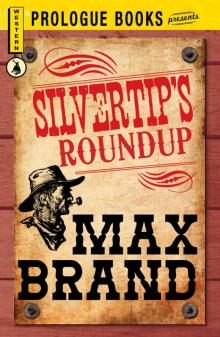 Silvertip's Roundup
Silvertip's Roundup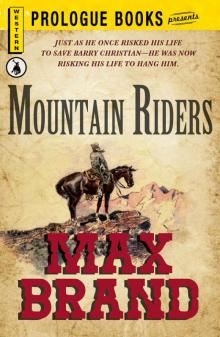 Mountain Riders
Mountain Riders Silvertip (1942)
Silvertip (1942)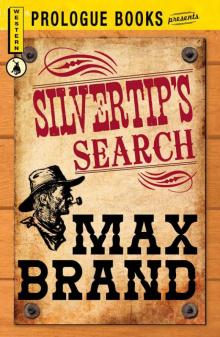 Silvertip's Search
Silvertip's Search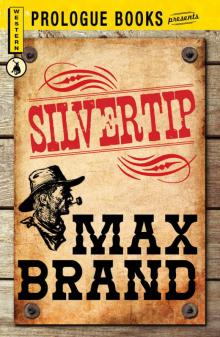 Silvertip
Silvertip Bull Hunter
Bull Hunter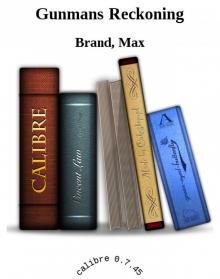 Gunmans Reckoning
Gunmans Reckoning The Seventh Man
The Seventh Man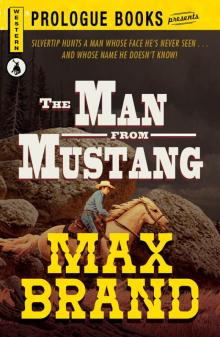 Man From Mustang
Man From Mustang Riders of the Silences
Riders of the Silences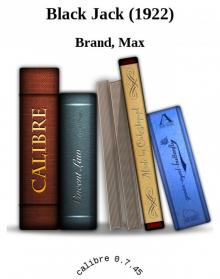 Black Jack (1922)
Black Jack (1922) Way of the Lawless
Way of the Lawless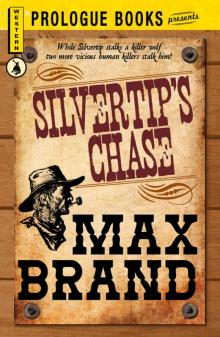 Silvertip's Chase
Silvertip's Chase Trailin
Trailin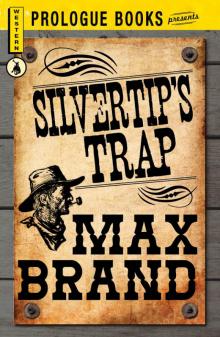 Silvertip's Trap
Silvertip's Trap Ronicky Doone (1921)
Ronicky Doone (1921) The Night Horseman
The Night Horseman the Garden Of Eden (1963)
the Garden Of Eden (1963)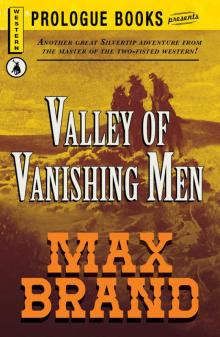 Valley of the Vanishing Men
Valley of the Vanishing Men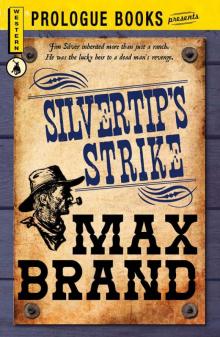 Silvertip's Strike
Silvertip's Strike Black Jack
Black Jack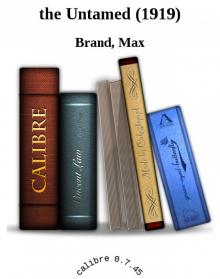 the Untamed (1919)
the Untamed (1919) Way Of the Lawless (1921)
Way Of the Lawless (1921) The Untamed
The Untamed